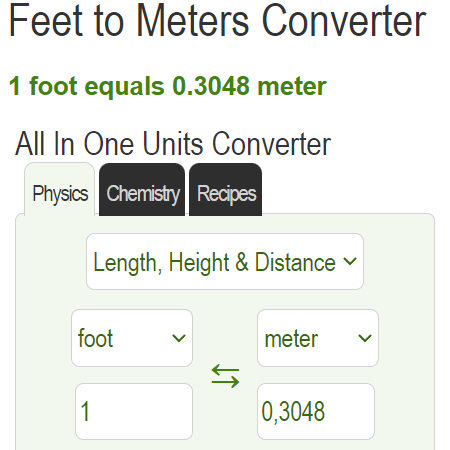1 m to microns
1 m is equal to 1000000 microns
m To Micron Converter
| ⇆ | ||
|
|
||
|
🔗 Help our site grow by sharing it!
|
||
To find the value in meter that corresponds to a value in microns, multiply the value in m by 1000000 (the conversion factor). Here is the Conversion formula
Value in microns = value in m × 1000000
Let's say that you have 1 m and you want to convert it to microns. By using the conversion formula provided above, you get:
Value in micron = 1 × 1000000 = 1000000 microns
This conversion formula works because one micron is equal to 1 × 10-6 m.
To convert a different value in m, simply replace the value in the formula above with the new value.
What is the Relationship Between M and Microns
The Exact Relationship is Defined as follows:
1 micron = 1 × 10-6 m
This means that to convert a measurement from m to microns, you multiply the value in m by 1 × 10-6.
Using The Calculator
Here is how to switch from m to microns:
- Determine the measurement in m that you are working with: For this example, let's use
1 m. - Apply the formula: Multiply the value in m by 1000000:
Value in microns = 1 × 1000000 - Perform the calculation: Youmay use want to use a calculator or do the math:
Value in microns = 1000000 microns
Quick Tips For Mental Math
If you don't have a calculator handy, or you want to do a quick mental estimate, you can approximate:
- Use 1000000 instead of 1000000 for a rough estimate.
- For example:
- 1 m ≈ 1000000 microns, (1000000, exactly)
- 2 m ≈ 2000000 microns, (2000000, exactly)
- 3 m ≈ 3000000 microns, (3000000, exactly)
Conclusion
You've learned how to convert m to microns and vice versa! Use the formula microns = m ÷ 1 × 10-6 for accurate results, or approximate using quick mental math for a rough estimate.
Common Questions This Converter Can Answer
Basic Conversions
- How many m are in 1 microns?
- 1 m is equal to how many microns?
- What is 1 m in microns?
Conversion Methods
- How do I convert from m to microns?
- What is the conversion factor between m and microns?
- What formula should I use to convert m to microns?
Practical Applications
- How do I measure m in microns?
- What's the equivalent of 1 m when expressed in microns?
- How can I convert between m and microns for my project?
Common Conversions
- What is 1 m in microns?
- How much is 10 m in microns?
- What's half a m in microns?
Professional Use
- How do I convert m to microns in technical documentation?
- What's the precise conversion rate from m to microns?
- How do international standards convert between m and microns?
Definition of Meter
A meter (m) is the fundamental unit of length in the International System of Units (SI). It is defined by taking the fixed numerical value of the speed of light in vacuum (c) to be 299,792,458 when expressed in the unit m/s. This modern definition, established in 1983, ensures that the meter is standardized through universal physical constants. The meter is used worldwide in science, industry, and everyday measurements. In practical terms, a meter is slightly longer than a yard, being approximately 39.37 inches. This unit is essential in construction, engineering, athletics, and countless other applications. The meter's subdivisions (centimeters, millimeters) and multiples (kilometers) form the basis of the metric system used globally.
Definition of Micron
A micron (μm), also called a micrometer, is one millionth (1/1,000,000) of a meter. This microscopic unit is crucial in:
- Industrial Applications:
- Air and liquid filtration ratings
- Surface finish specifications
- Paint coating thickness measurements
- Scientific Research:
- Cell biology measurements
- Particle size analysis
- Semiconductor manufacturing
- Quality Control:
- Material thickness verification
- Precision manufacturing tolerances
- Optical coating specifications



